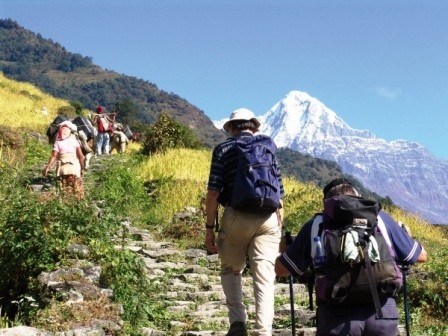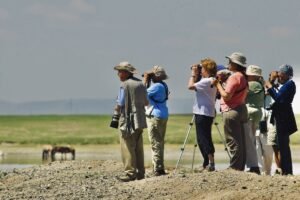Sustainable Tourism: A Key to Global Solutions

When most people think of tourism, they probably don’t think about an industry that can contribute to global solutions for the difficult challenges facing the planet.
Tourism is in fact, the fastest growing industry in the world. According to the U.N. World Tourism Organization (UNWTO), tourism visits grew from about 900 to 940 million visitors last year and is projected to rise to 1.6 billion by the year 2020.
The UNWTO states that tourism is the largest industry in the world with an estimated 11.5% of the world GDP and employing about 12.5% of the world’s work force.
Tourism can be the key for implementing many global solutions for challenges such as climate change, poverty reduction, waste reduction, preserving eco-systems and moving the world to a more sustainable planet.
Unlike the fossil fuel industries that often resist serious efforts to address climate change the tourist industry realizes that climate change left unmitigated threatens their business. One example is the Caribbean region where climate change is already threatening the region with several challenges including but not limited to:
• predictions of increased frequency and intensity of tropical storms and hurricanes.
• rising sea levels resulting in salt water intrusion to coastal habitat and fresh water supplies.
• changing weather patterns and new drought cycles that threaten food production.
• disruptions in rainfall patterns that threaten water supplies.
• bleaching of the coral reefs that threaten vital tourist attractions.
• increases of diseases such as dengue fever due to warmer temperatures.
Unless these climate change issues are mitigated, the quality of the tourist experience is likely to decrease and the visitors will be less likely to come to the region.
Tourism also has an strong interest in alleviating poverty. Poverty in tourist areas has the potential for:
• driving away business.
• increased crime risks.
• increased spread of infectious disease.
• destruction of the environment.
• low quality of skills and services.
Tourists often come from more wealthy countries. If tourist accommodations are surrounded by depressing poverty, high crime or security issues, or constant concerns of catching infectious disease, they will be become places tourists will avoid visiting or scheduling return visits.
Tourists are also increasingly discriminating re: local arts and crafts, quality of services expected, and opportunities of the local culture. If abject poverty keeps local artists from improving skills, the services coming from an uneducated work force, or the culture either to depressing or unsafe to venture out in, then the tourist destination or service suffers as a result.
Tourism destinations and resorts have an interest in keeping their areas clean and pristine. Fishing, kayaking, paddle boarding, diving, snorkeling, swimming, boating, or walking on the beach are all experiences where pollution can quickly turn a positive activity sour.
In contrast, tourist areas that are kept clean and pristine are likely to not only be more valued experiences but also places tourists will more likely want to return.
Tourism needs not only protection. but where possible enhancement of the surrounding ecosystems to insure the continued quality of the tourism experience. As a result, tourism has a vested interest in conservation, biodiversity, and sustainable fisheries that other industries may not care as much about.
It is encouraging to note that a growing movement in support of sustainable tourism has been developing the past few years. Progress is being seen in the tourist industry, government & NGO’s, and education in support of these efforts. A few examples are as follows:
In the tourist industry, Walt Disney Company that includes Walt Disney World Resort® the most visited tourist destination in the world, has taken strong leadership for sustainable tourism.
Disney corporate goals include:
1. Reduce zero net direct greenhouse emissions 50% from the 2006 baseline by 2012 and then subsequently become a net zero greenhouse gas emission company.
2. Reduce electricity consumption by 10% from 2006 baseline levels by 2012.
3. Decrease waste sent to landfills by 50% from 2006 baseline levels by 2013 and then work to send zero waste to landfills.
4. Have a net positive impact on ecosystems and continue to increase its grants from the Disney Worldwide Conservation Fund.
Imagine the impact if the entire tourist industry would follow Walt Disney Company’s lead toward sustainable tourism. While some are arguing whether it is feasible to reduce carbon emissions 10% in government forums, Disney is reducing carbon emissions 50% in a short six years. They are making these reductions in a way that also is enhancing net profits.
The Global Sustainable Tourism Council (GSTC) is a global leader in promoting sustainable tourism. What began as a collaborative effort of the U.N. World Tourism Organization, the U.N. Environment Programme (UNEP), the Rainforest Alliance, and the U.N. Foundation, has now expanded to include over 200 members from around the globe.
The GSTC represents a diverse membership including U.N. agencies, leading travel companies, hotels, country tourism boards and tour operators.
The GSTC has recently released a new global standard for sustainable tourism the “Global Sustainable Tourism Criteria” The criteria requires members of the tourist industry who want to be certified to meet standards include
• Demonstrate effective sustainable management. This includes making sure that long range planning is in place to continue to operate more sustainably.
• Maximize social and economic benefits to the local community and minimize community impacts. This includes providing a living wage to people working in the tourist industry as well as providing economic benefits to the larger community where the tourist business is located.
• Maximize benefits to cultural heritage and minimize negative impacts. This includes protection of indigenous people’s rights as well as preserving sacred and cultural sites of the past.
• Maximize benefits to the environment and minimize negative impacts. This includes addressing the critical issues of carbon emissions, water, waste management, biodiversity, and protection of ecosystems.
If implemented on a large scale throughout the tourist industry, the GSTC criteria will go a long way to address the issues of climate change, alleviation of poverty, waste reduction, conservation of water, and biodiversity, cultural heritage, and protection and enhancement of ecosystems.
See (http://new.gstcouncil.org/resource-center/gstc-criteria)
Educational Institutions are also beginning to address the issues of sustainable Tourism as well as model sustainability on their campus.
California Lutheran University (CLU) and the University of South Florida (USF), where the two of us work, have strong campus sustainability programs that work to model sustainable lifestyles for the campus community. Both universities are signatories to the American College & University Presidents Climate Commitment. This commitment includes a 5% reduction in energy use and continuing annual reductions, as well as establishing a target date for climate neutrality.
CLU states “we make a commitment to continue to learn how to live responsibly and justly on our campus and in our communities. Sustainability must be a campus-wide effort rooted in awareness that our immediate, local practices often have global implications.”
USF has begun a new Sustainable Tourism Concentration as part of their M.A. in Global Sustainability program. The program includes education on implementing the new GSTC criteria.
Working together, the tourist industry, the leadership of the GSTC, and educational institutions can begin to implement models for sustainability that others may follow.
Sustainable tourism can lead the way in demonstrating how to break the fossil fuel addiction, model good water conservation and waste management, and place a higher value on protecting biodiversity and ecosystems.
Sustainable tourism also reduce costs and increase net revenues of the business, created economic development for the community, and is projected to create 69 million new jobs in the next decade.
Each traveler can assist in sustainable tourism by choosing resorts and destinations that practice sustainable tourism as evidenced by being certified by a GSTC recognized sustainable tourism certification program.
Sustainable tourism is indeed a key to many global solutions and may be one of the most hopeful strategies for the global transition to sustainability.
(This post was co-authored by Dr. David Randle. Dr. David Randle is the Director of USF Masters of Global Sustainability Sustainable Tourism concentration program, and President & CEO WHALE Center.Earth Dr Reese Halter is an award-winning science communicator:voice for ecology and distinguished conservation biologist at California Lutheran University. His latest books are: The Incomparable Honeybee and The Insatiable Bark Beetle.)














